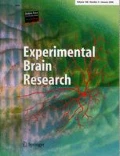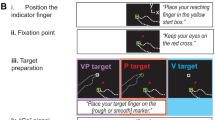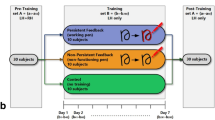Abstract
If visual feedback is discordant with movement direction, the visuo-motor mapping is disrupted, but can be updated with practice. In this experiment subjects practiced discrete arm movements under conditions of visual feedback rotation. One group was exposed to 10°-step increments of visual feedback rotation up to a total of 90°, a second group to a 90° visual feedback rotation throughout the experiment. After the first group reached the 90° visual feedback rotation, its subjects performed faster, with less spatial error, and showed larger aftereffects than the subjects who practiced constantly under the 90° visual feedback rotation condition. Results suggest that gradually increasing feedback distortion allows more complete adaptation than a large, sudden distortion onset.
Similar content being viewed by others
Author information
Authors and Affiliations
Additional information
Received: 3 December 1996 / Accepted: 14 February 1997
Rights and permissions
About this article
Cite this article
Kagerer, F., Contreras-Vidal, J. & Stelmach, G. Adaptation to gradual as compared with sudden visuo-motor distortions. Exp Brain Res 115, 557–561 (1997). https://doi.org/10.1007/PL00005727
Issue Date:
DOI: https://doi.org/10.1007/PL00005727




